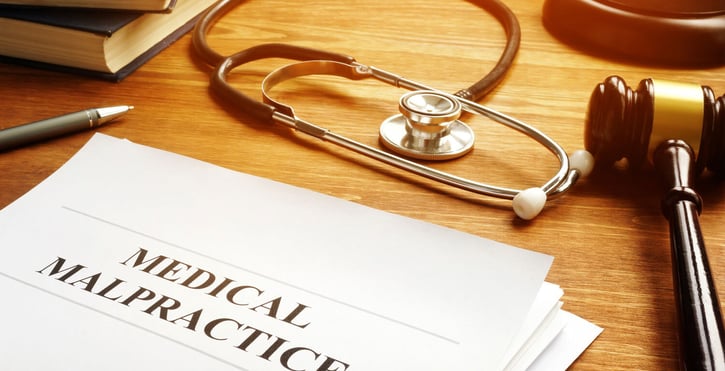
Medical malpractice is a serious legal issue that occurs when a hospital, doctor, or other healthcare professional causes injury to a patient through negligent acts or omissions.
This negligence can manifest in various forms, including errors in diagnosis, treatment, aftercare, or health management.
When medical professionals fail to adhere to the accepted standard of care, patients may suffer significant harm, leading to medical malpractice lawsuits.
Victims must understand their rights and seek the assistance of experienced medical malpractice attorneys to navigate the complexities of these cases.
Table Of Contents
- What's Considered Medical Malpractice?
- Examples Of Medical Malpractice
- The Role of Expert Witnesses in Medical Malpractice Cases
- Understanding Damages in Medical Malpractice Lawsuits
- Navigating The Legal Process
- The Importance of Patient Advocacy and Informed Consent
- Contact Julian Sanders Law
What's Considered Medical Malpractice?
For an incident to be considered medical malpractice under the law, the claim must exhibit the following characteristics:
- Violation of the Standard of Care: The law recognizes that healthcare professionals must adhere to certain medical standards, known as the standard of care, deemed acceptable by the medical community under similar circumstances. Patients have the right to expect care consistent with these professional standards. If it is determined that these standards were not met, then negligence may be established, forming the basis for a medical malpractice claim.
- Injury Caused by Negligence: Merely violating the standard of care is not enough for a valid medical malpractice claim. The patient must also prove that they sustained an injury that would not have occurred without negligence. An unfavorable outcome alone does not constitute malpractice. There must be a direct link between the negligence and the injury. If there is an injury without negligence or negligence that did not result in an injury, there is no basis for a claim.
- Significant Damages Resulting from the Injury: Medical malpractice lawsuits are often costly, requiring the testimony of multiple medical experts and extensive deposition testimony. For a case to be viable, the patient must demonstrate that significant damages resulted from the injury caused by medical negligence. These damages may include disability, loss of income, unusual pain, suffering, hardship, or substantial past and future medical bills. If the damages are minor, the cost of pursuing the case might exceed the potential recovery. To pursue a medical malpractice claim, the patient must show that the injury led to substantial negative impacts on their life or financial well-being.
Examples of Medical Malpractice
Medical malpractice encompasses a wide range of errors and omissions by healthcare providers.
Here are some common examples of medical negligence that might lead to a medical malpractice lawsuit:
- Failure to Diagnose or Misdiagnosis: Overlooking or incorrectly identifying a medical condition can lead to incorrect treatment or no treatment at all, worsening the patient's condition.
- Misreading or Ignoring Laboratory Results: Overlooking critical information in lab results can result in misdiagnosis or delayed treatment.
- Unnecessary Surgery: Performing surgery that is not medically required exposes patients to unnecessary risks and potential harm.
- Surgical Errors or Wrong Site Surgery: Operating on the wrong body part or making avoidable mistakes during surgery can have devastating consequences for the patient.
- Improper Medication or Dosage: Prescribing the wrong medication or dosage can lead to adverse drug reactions or insufficient treatment.
- Poor Follow-up or Aftercare: Neglecting post-treatment care can result in complications or inadequate recovery.
- Premature Discharge: Discharging a patient from the hospital too early can worsen their condition or the need for readmission.
- Disregarding or Not Taking Appropriate Patient History: Failing to consider a patient's medical history can lead to incorrect diagnoses or unsafe treatment plans.
- Failure to Order Proper Testing: Neglecting to order necessary diagnostic tests can delay treatment and worsen the patient's condition.
- Failure to Recognize Symptoms: Overlooking key symptoms can result in a failure to diagnose or treat serious medical conditions.
These examples of medical malpractice highlight the importance of thorough and careful medical care.
Patients who have experienced such negligence should consult with medical malpractice attorneys to understand their legal rights and options.

The Role of Expert Witnesses in Medical Malpractice Cases
In medical malpractice cases, expert witnesses play a key role in determining whether a healthcare provier's actions deviate from the standard of care.
These medical experts, often experienced healthcare professionals or specialists, provide critical testimony on complex medical issues, helping the court understand the nuances of the case.
Their insights can significantly impact the outcome of a medical malpractice lawsuit as they shed light on medical errors, the appropriateness of the medical treatment provided, and the causal link between the healthcare provider's negligence and the patient's injuries.
Expert witnesses are typically required to thoroughly understand medical practices, procedures, and standards in the relevant field.
They must articulate the proper standard of care that should have been provided under the circumstances and explain how the healthcare provider's actions fell short.
Their testimony often involves a detailed analysis of medical records, diagnostic tests, and the patient's medical history.
Furthermore, expert witnesses can offer opinions on the extent of the patient's injuries and their impact on the patient's life.
This can include discussing the patient's physical pain, emotional distress, and any long-term consequences of the medical mistakes.
In some cases, multiple expert witnesses may be called upon to address different aspects of the case.
This could include a medical expert discussing the standard of care and a financial expert calculating the economic damages resulting from the malpractice.
Their combined testimony provides a comprehensive view of the case, helping the jury or judge make an informed decision.
Their expertise and testimony are key to establishing negligence, causation, and damages, essential to a successful medical malpractice claim.
Understanding Damages in Medical Malpractice Lawsuits
In medical malpractice lawsuits, victims often endure significant damages that extend beyond physical injuries.
Compensatory damages are sought to cover tangible losses such as medical bills, rehabilitation costs, and lost income due to an inability to work.
These damages aim to restore the victim to the financial position they would have been in had the malpractice not occurred.
Non-economic damages address the intangible aspects of the victim's suffering.
This includes compensation for physical pain, emotional distress, and the loss of enjoyment of life resulting from medical malpractice.
These damages recognize the profound personal impact of medical errors on a victim's quality of life.
In instances of particularly egregious conduct, punitive damages may be awarded.
These are not intended to compensate the victim but rather to punish the healthcare provider for reckless or intentional misconduct and to serve as a deterrent to similar behavior in the healthcare community.
However, not all states allow punitive damages in medical malpractice cases, and the amount that can be awarded may be limited.
Understanding the different types of damages available in medical malpractice lawsuits is crucial for victims seeking justice and compensation for their suffering.
Navigating the Legal Process
The journey through a medical malpractice claim is intricate and requires meticulous attention to detail.
Victims must compile compelling evidence, including medical records, expert opinions, and documentation of damages, to build a strong case.
Establishing the key legal elements—duty of care, breach of duty, causation, and damages—is essential for success.
Adhering to the statute of limitations is critical, as failing to file within the designated time frame can result in the dismissal of the case.
Additionally, many states require plaintiffs to meet pre-suit requirements, such as submitting an affidavit of merit from a qualified medical expert, to demonstrate the claim's legitimacy before proceeding to court.
Experienced medical malpractice lawyers are invaluable in navigating this complex process.
They provide expert guidance, ensuring compliance with legal requirements and deadlines and advocating for the victim's rights.
Their expertise is crucial in negotiating settlements or presenting a compelling case in court, aiming to secure fair compensation for the victim's injuries and losses.

The Importance of Patient Advocacy and Informed Consent
Patient advocacy and informed consent are critical components in preventing medical malpractice and protecting patient rights.
Empowered patients who actively participate in their healthcare decisions are better equipped to collaborate with their healthcare providers, leading to improved outcomes and reduced risk of medical errors.
Patient advocacy involves patients or their representatives taking a proactive approach to their healthcare, including researching their conditions, asking detailed questions, and seeking second opinions when necessary.
This active engagement helps patients understand their medical treatment options and their potential risks, enabling them to make informed choices.
Informed consent is a fundamental ethical and legal requirement in healthcare.
It ensures that patients are fully aware of the risks, benefits, and alternatives of proposed medical procedures.
It fosters transparency and trust in the doctor-patient relationship, allowing patients to give voluntary and informed permission for medical interventions.
Failure to obtain informed consent can result in legal repercussions for healthcare providers and may constitute medical malpractice.
Healthcare professionals must communicate effectively to ensure that patients understand the information provided and feel comfortable asking questions.
Ultimately, patient advocacy and informed consent are pivotal in promoting patient safety, autonomy, and satisfaction in the healthcare system.
Contact Julian Lewis Sanders Law
Medical malpractice is a serious legal issue that occurs when a healthcare provider's negligent actions lead to patient harm.
It can manifest in various forms, including misdiagnosis, surgical errors, and improper medication.
If you or a loved one has suffered due to medical negligence, seeking legal assistance is crucial.
Contact the Julian Lewis Sanders Law Offices for a free consultation to discuss your medical malpractice claim.
Our experienced medical malpractice attorneys are dedicated to helping you secure the compensation and justice you deserve.
Posted by Julian Lewis Sanders
At The Law Offices of Julian Lewis Sanders & Associates, we understand the gravity of personal injury situations - it's our priority. Committed to aiding you in your time of need, we specialize in listening to your story, discerning your individual needs, and swiftly executing strategic actions to secure the compensation you deserve. Based in Georgia, our legal team comprises experienced personal injury attorneys dedicated to delivering optimal service tailored to your unique circumstances.
Facebook


